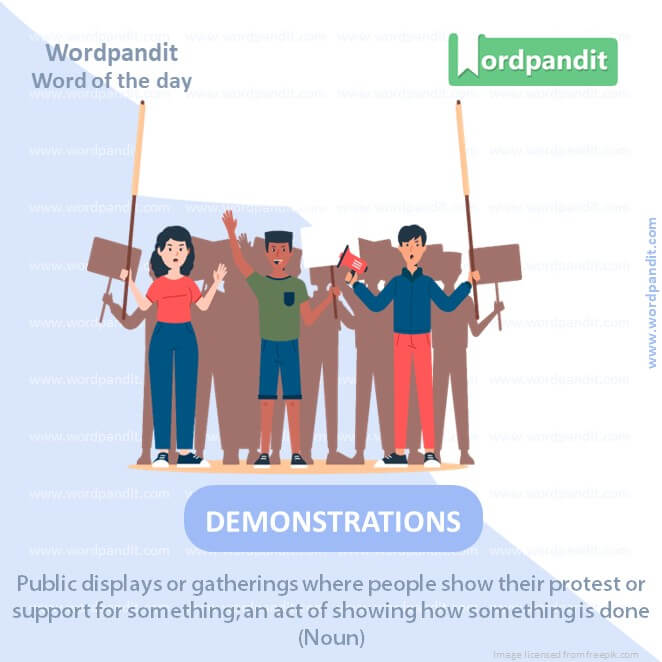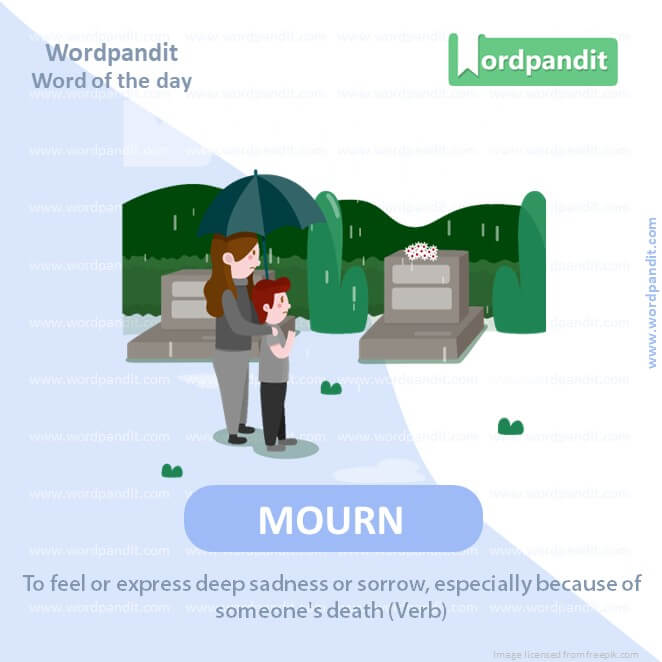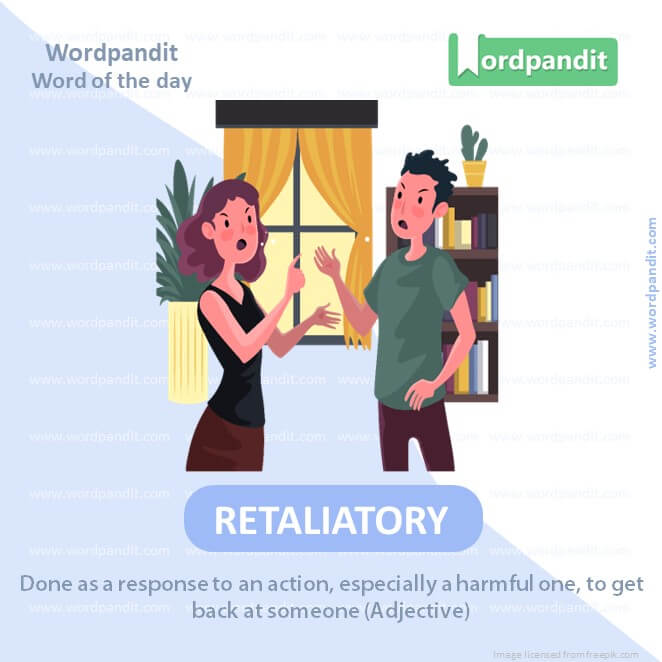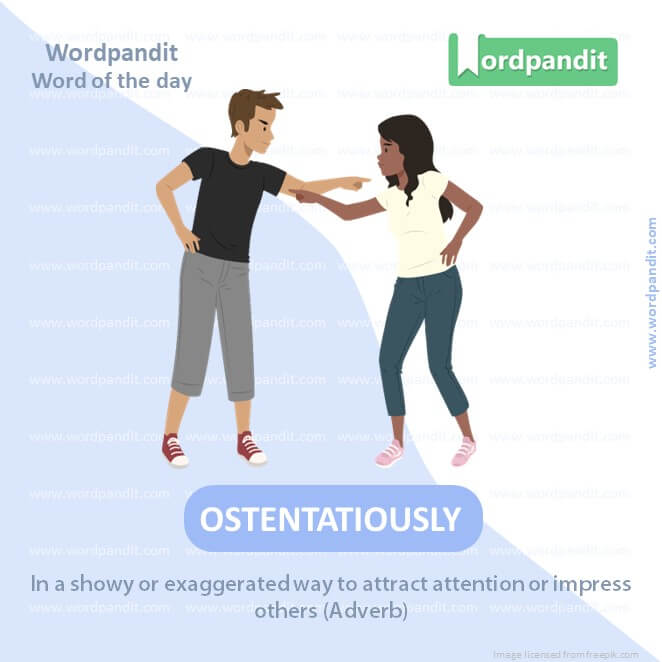Daily Vocabulary Words: List of Daily Used Words in Leading International Newspapers
Hi there. Welcome to this special section @ Wordpandit.
Our endeavour here is very simple: to highlight important daily vocabulary words, which you would come across in leading newspapers in the country. We have included the following newspapers in our selection:
• The New York Times
• The Washington Post
• Scientific American
• BBC
• The Guardian
• Psychology Today
• Wall Street Journal
• The Economist
We are putting in extensive work for developing your vocabulary. All you have got to do is be regular with this section and check out this post on a daily basis. This is your repository of words that are commonly used and essentially, we are posting a list of daily used words. Hence, this has significant practical application as it teaches you words that are used commonly in leading publications mentioned above.
Visit the website daily to learn words from leading international newspapers.

WORD-1: ENTHUSIASM
CONTEXT: While other post-communist states embraced liberal democracy with enthusiasm, the US secretary of state, Madeleine Albright, called it “the black hole” of the region.
SOURCE: The Guardian
EXPLANATORY PARAGRAPH: Enthusiasm is when you are really, really excited about something! Imagine you see a big, colorful rainbow in the sky, and you feel so happy you want to jump and shout. That’s being enthusiastic! You can be enthusiastic about toys, games, or even eating ice cream. When you’re enthusiastic, you’re full of energy and joy.
MEANING: A strong excitement or eagerness for something or about doing something (Noun).
PRONUNCIATION: en-THOO-zee-az-um
SYNONYMS: Excitement, Zeal, Passion, Eagerness, Fervor, Zest, Keenness
USAGE EXAMPLES:
1. His enthusiasm for science made him a great inventor.
2. The children showed great enthusiasm during the field trip.
3. Her enthusiasm is contagious, making everyone want to join in.
4. The team lost the game, but their enthusiasm was not diminished.

WORD-2: DEMONSTRATIONS
CONTEXT: In the biggest demonstrations since the Velvet Revolution that brought down communism in 1989, tens of thousands of Slovaks took to the streets to express their fury.
SOURCE: The Guardian
EXPLANATORY PARAGRAPH: Demonstrations are like show-and-tell for grown-ups and sometimes kids too. It’s when people come together to show how they feel about something important. They might carry signs or sing songs to let others know what they think. Like if a lot of people think that a playground should be cleaner, they might gather around it with signs that say, “Clean Our Playground!”
MEANING: Public displays or gatherings where people show their protest or support for something; an act of showing how something is done (Noun).
PRONUNCIATION: dem-uhn-STRAY-shuns
SYNONYMS: Protests, Rallies, Marches, Displays, Exhibitions, Presentations, Acts
USAGE EXAMPLES:
1. The demonstrations against pollution were peaceful.
2. She gave a cooking demonstration at the fair.
3. The students held demonstrations demanding better food in the cafeteria.
4. The company provided demonstrations of their new software.

WORD-3: MOURN
CONTEXT: How about laws like Israel’s that deny Palestinians even the right to mourn the loss of ancestral homes and land or seek to reclaim them? This includes Amendment 40 to the Budget Foundations Law that criminalises the commemoration of the Palestinian Nakba.
SOURCE: Al Jazeera
EXPLANATORY PARAGRAPH: Mourn means to feel really, really sad because something bad happened, like when someone goes away forever, or a pet runs away. People might cry or be quiet when they mourn. It’s okay to feel this way because it means you really cared about someone or something.
MEANING: To feel or express deep sadness or sorrow, especially because of someone’s death (Verb).
PRONUNCIATION: morn
SYNONYMS: Grieve, Lament, Sorrow, Bewail, Regret, Weep
USAGE EXAMPLES:
1. We mourn the loss of our dear friend.
2. The community gathered to mourn the closing of the local school.
3. She took time off work to mourn her grandfather.
4. Nations mourned the victims of the natural disaster.

WORD-4: RETALIATORY
CONTEXT: The DMC added that to quell the anti-CAA protests, the “retaliatory plan” of the Hindu mob was devised “with support of the administration and police”.
SOURCE: Al Jazeera
EXPLANATORY PARAGRAPH: Retaliatory is a big word that means doing something back to someone because they did something to you first. Like if someone takes your toy, and then you take one of theirs, that’s retaliatory. But remember, two wrongs don’t make a right!
MEANING: Done as a response to an action, especially a harmful one, to get back at someone (Adjective).
PRONUNCIATION: rih-TAL-ee-uh-tor-ee
SYNONYMS: Revengeful, Vindictive, Avenging, Reprisal, Payback, Reciprocal
USAGE EXAMPLES:
1. The company took retaliatory measures against the employees who went on strike.
2. His retaliatory actions made the situation worse.
3. She filed a retaliatory complaint against her manager.
4. The government warned against any retaliatory attacks.

WORD-5: OSTENTATIOUSLY
CONTEXT: The confrontation ostentatiously ended in a deal that saw the Wagner Group’s forces move to Belarus while Prigozhin was allowed to travel back to Russia, access his assets and property, and continue his involvement in Africa.
SOURCE: Al Jazeera
EXPLANATORY PARAGRAPH: Ostentatiously is a fancy word that means showing off a lot so that people notice you. Imagine wearing a big, sparkly crown and a cape just to go to the grocery store—that’s being ostentatious!
MEANING: In a showy or exaggerated way to attract attention or impress others (Adverb).
PRONUNCIATION: os-ten-TAY-shus-lee
SYNONYMS: Flashily, Showily, Flamboyantly, Pretentiously, Extravagantly, Garishly
USAGE EXAMPLES:
1. She arrived ostentatiously in a limousine.
2. He spoke ostentatiously about his many achievements.
3. She wore her new diamond ring ostentatiously.
4. He decorated his office ostentatiously to impress clients.
WORD-6: FREAKISH
CONTEXT: As I wrote after Letby’s conviction, this was a horrifyingly freakish criminal case.
SOURCE: The Guardian
EXPLANATORY PARAGRAPH: Freakish means something is really weird or unusual. Imagine if you saw a purple cow with blue spots—that would be freakish! Sometimes people use this word to talk about things that are so strange, they make you look twice.
MEANING: Extremely strange, unusual, or unexpected (Adjective).
PRONUNCIATION: FREE-kish
SYNONYMS: Bizarre, Odd, Weird, Unusual, Abnormal, Outlandish
USAGE EXAMPLES:
1. The freakish weather ruined our plans for the beach.
2. His freakish talents amazed everyone.
3. She had a collection of freakish artifacts.
4. The movie had some freakish special effects.
WORD-7: DETERIORATION
CONTEXT: If I’d been given more detail about Martha’s deterioration, I’d have spent every waking minute trying to educate myself about sepsis and septic shock.
SOURCE: The Guardian
EXPLANATORY PARAGRAPH: Deterioration means something is getting worse or breaking down. Like when a toy gets old and starts to fall apart, or when a fruit gets all mushy and yucky—that’s deterioration.
MEANING: The process of becoming progressively worse or falling apart (Noun).
PRONUNCIATION: dih-TEER-ee-oh-RAY-shun
SYNONYMS: Decline, Decay, Degradation, Worsening, Breakdown, Erosion
USAGE EXAMPLES:
1. The deterioration of the old building was obvious.
2. Pollution leads to the deterioration of air quality.
3. He was worried about the deterioration of his health.
4. The report noted the deterioration in educational standards.
WORD-8: ENTHUSIASM
CONTEXT: Starmer rightly feels hegemonic now, but the opposition’s polling lead is entirely down to Tory self-destruction, and not because of any enthusiasm for the leader and his largely anonymous team.
SOURCE: The Guardian
EXPLANATORY PARAGRAPH: Enthusiasm is when you are really, really excited about something! Imagine you see a big, colorful rainbow in the sky, and you feel so happy you want to jump and shout. That’s being enthusiastic!
MEANING: A strong excitement or eagerness for something or about doing something (Noun).
PRONUNCIATION: en-THOO-zee-az-um
SYNONYMS: Excitement, Zeal, Passion, Eagerness, Fervor, Zest, Keenness
USAGE EXAMPLES:
1. His enthusiasm for science made him a great inventor.
2. The children showed great enthusiasm during the field trip.
3. Her enthusiasm is contagious, making everyone want to join in.
4. The team lost the game, but their enthusiasm was not diminished.
WORD-9: DAUNTING
CONTEXT: When you are in hospital you feel powerless, and everyone knows that questioning senior medics is daunting.
SOURCE: The Guardian
EXPLANATORY PARAGRAPH: Daunting means something feels so big or difficult that it scares you a little. Imagine standing in front of a huge mountain you have to climb. Wow, that would be daunting!
MEANING: Intimidating or causing fear, especially because of the difficulty or size of a task (Adjective).
PRONUNCIATION: DAWN-ting
SYNONYMS: Intimidating, Frightening, Overwhelming, Discouraging, Formidable, Scary
USAGE EXAMPLES:
1. Climbing the mountain was a daunting task.
2. The project seemed daunting at first.
3. She faced the daunting challenge with courage.
4. He found the idea of public speaking daunting.
WORD-10: LUCRATIVE
CONTEXT: Whether it was a planned act of revenge by the Kremlin to “save face” and “reassert control” or a more selfish move orchestrated by actors who wanted to take over Wagner’s lucrative operations in Africa and elsewhere is not clear.
SOURCE: Al Jazeera
EXPLANATORY PARAGRAPH: Lucrative means you can make a lot of money from doing something. Imagine if you started a lemonade stand and everyone loved your lemonade so much that you sold cups and cups of it. You’d make lots of money! That would be a lucrative lemonade stand.
MEANING: Producing a large amount of money or profit (Adjective).
PRONUNCIATION: LOO-kruh-tiv
SYNONYMS: Profitable, Rewarding, Gainful, Fruitful, Successful, Advantageous
USAGE EXAMPLES:
1. He found a lucrative job right after college.
2. The movie was a lucrative investment for the studio.
3. She wrote a lucrative book.
4. They entered a lucrative partnership with the new company.
Vocabulary Definition
When navigating the extensive seas of language learning, the ‘vocabulary definition’ stands as a beacon guiding our course. Vocabulary definition – the meaning of a word – sets the stage for effective communication and comprehension. Learning accurate vocabulary definition plays a pivotal role in building an expansive and versatile linguistic repertoire.
To start learning the ‘vocabulary definition’, begin with a word familiar to you and research its definition. As familiarity blooms, gradually expand your range, focusing on one word at a time. Before moving to a new word, grasp its usage and nuances in different contexts. This tailored approach ensures a deep understanding of each ‘vocabulary definition’.
Incorporating technological resources can greatly assist in mastering the ‘vocabulary definition’. Dictionaries, both traditional and online, provide comprehensive definitions for a myriad of words. Vocabulary building apps and websites are also excellent platforms that provide ‘vocabulary definitions’ and relevant examples.
When it comes to understanding ‘vocabulary definition’, frequent application is key. Regularly using these words in sentences, both written and verbal, illustrates their real-world utility and reinforces their meaning into your long-term memory.
Reading widely is an indispensable strategy for learning ‘vocabulary definition’. By delving into diverse reading materials, you will naturally encounter new vocabulary, which allows you to understand the definition of words within context and extrapolate their meanings.
Finally, to consolidate your learning of ‘vocabulary definition’, actively engage in practices like word mapping or charting. These visual tools create a spatial representation of words and their definitions, helping you to retain them more effectively.
In sum, comprehending ‘vocabulary definition’ is a hefty yet rewarding task. With consistent effort, curiosity, and the right resources, mastering ‘vocabulary definition’ becomes an achievable feat that contributes to enriched communication and broadened horizons.







